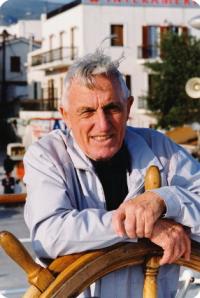 We were saddened to learn that John Harland has died. He passed away peacefully on May 11th, a few days after his ninety-fifth birthday. After a career in medicine, Dr. Harland became known as a researcher and author on maritime history. His book, Seamanship in the Age of Sail: An Account of the Shiphandling of the Sailing Man-of-War 1600-1860, Based on Contemporary Sources, illustrated by Mark Myers, is an encyclopedic and indispensable resource for anyone interested in the development and the details of sailing rigs in the age of sail. Beyond enjoying and relying on his work, I exchanged a few emails with Dr. Harland over the years and always found him to be incredibly knowledgeable, witty, and generous. He will be missed.
We were saddened to learn that John Harland has died. He passed away peacefully on May 11th, a few days after his ninety-fifth birthday. After a career in medicine, Dr. Harland became known as a researcher and author on maritime history. His book, Seamanship in the Age of Sail: An Account of the Shiphandling of the Sailing Man-of-War 1600-1860, Based on Contemporary Sources, illustrated by Mark Myers, is an encyclopedic and indispensable resource for anyone interested in the development and the details of sailing rigs in the age of sail. Beyond enjoying and relying on his work, I exchanged a few emails with Dr. Harland over the years and always found him to be incredibly knowledgeable, witty, and generous. He will be missed.
The Naval Marine Archive — Canadian Collection has posted an obituary for John Harford Harland, which reads in part:
Dr. John Harland was born 8 May 1923 in Belfast. At an early age, he developed an intense interest in ships and sailors, enjoying visits to the Belfast docklands as a boy and making ship models. He was educated at Methodist College and Queen’s University, Belfast, entering Medical School in September 1940. In December 1942, he interrupted medical studies to join the Royal Navy as a “Hostilities-only” volunteer. Following basic training at HMS Raleigh, mandatory sea-time aboard HMS Pangbourne, a WW1 vintage coal-burning fleet minesweeper, he underwent officer training at HMS King Alfred and additional torpedo and gunnery training in preparation for service in Coastal Forces.
In early 1944, he was posted to the 123rd coastal force flotilla in Freetown, skippering motor launch HDML 1106 and B-class Fairmile ML 256. In early 1945 he was posted to Cape Town, where his first task was ferrying a series of 60-foot Motor Fishing Vessels from the Cape to Durban. These craft were propelled by a small diesel but also equipped with sails. While working at the Sea Transport Office he was involved in the return of several whale-catchers to the Tønsberg Whaling Company. These had been requisitioned for naval service early in the War. After a further year as Transport Officer at the Naval Air Station, Cape Town, he returned to the UK for demobilization and resumption of medical school, graduating in December 1949. He emigrated to Canada in January 1951, later undergoing training as an anesthesiologist. Dr. Harland retired from practice in 1986.
During naval service he developed a special interest in sailing warships and steam whale catchers, and in the course of research, he became familiar with several foreign languages particularly German and Norwegian. After the Navy, he retained an interest in maritime history and has authored five books on the subject. The first two in the list were inspired by experience in South Africa:
Seamanship in the Age of Sail with Mark Myers (1984)
Catchers and Corvettes: The Steam Whale Catcher in Peace & War 1860-1960 (with John McKay 1992)
The Flower Class Corvette HMCS Agassiz with John McKay (1993)
Ships & Seamanship: The Maritime Prints of JJ Baugean (2000)
Capstans & Windlasses: An Illustrated History of their use at Sea (2003)
Click here to read the full biography at the Naval Marine Archive — Canadian Collection.

I’m going to guess that the last title is meant to be Capstans and Windlassses…captains known to be of uncertain “use at sea.”
What a man , what a loss.His publications will be his memorial , and the quality of his research something to aim for.
You are, of course, correct. For once the typo was not entirely mine. (A rare thing indeed.) I copied it from the NMA page. Nevertheless, I should have noticed it. I fixed it. Thanks for the catch.